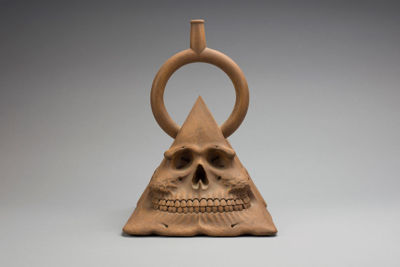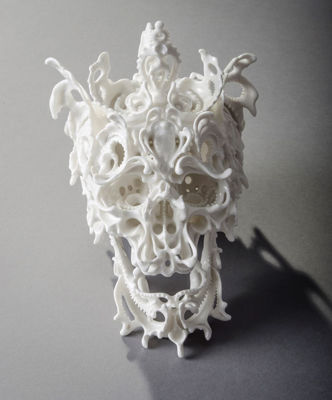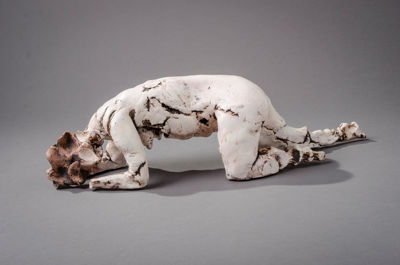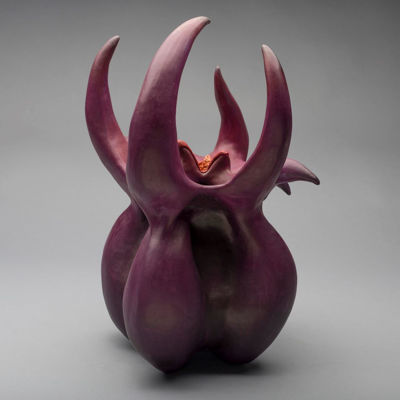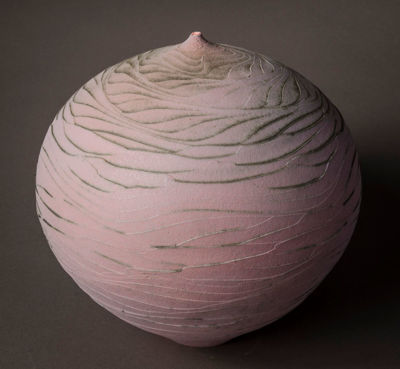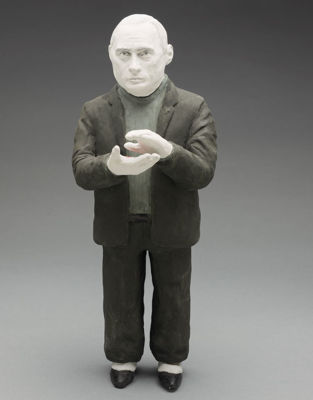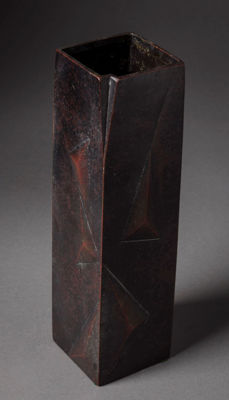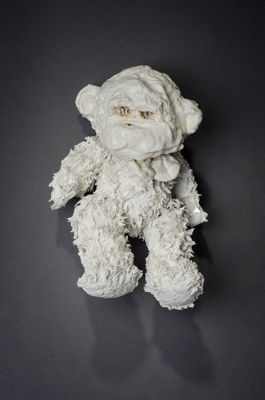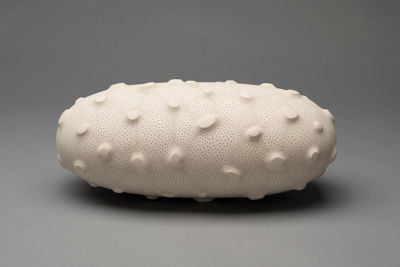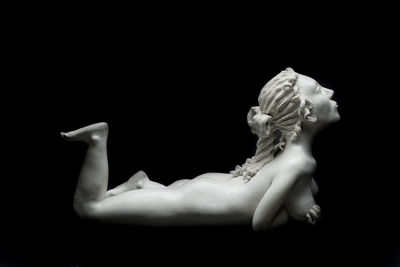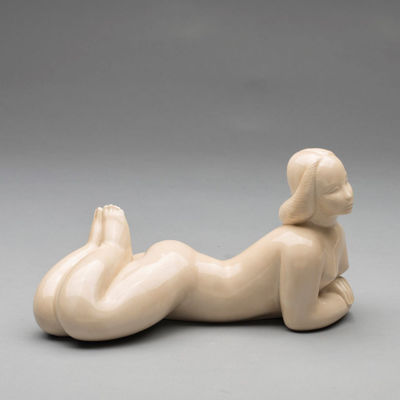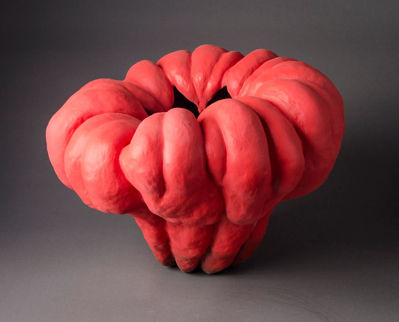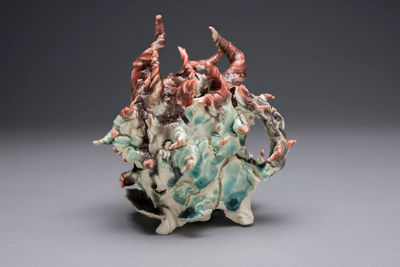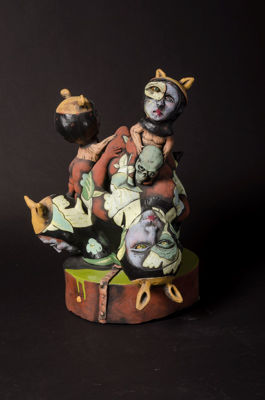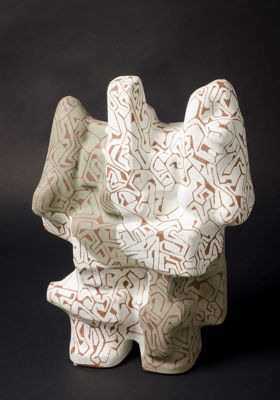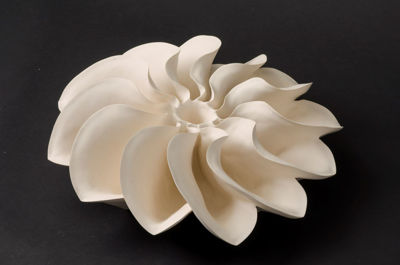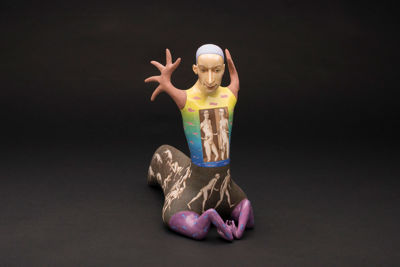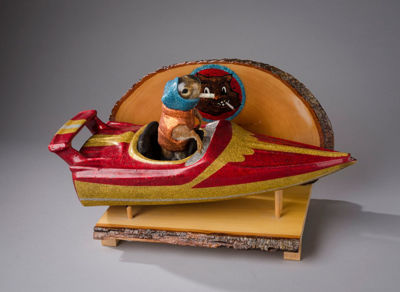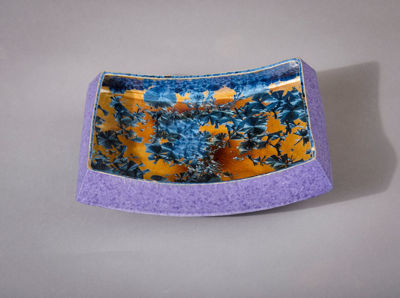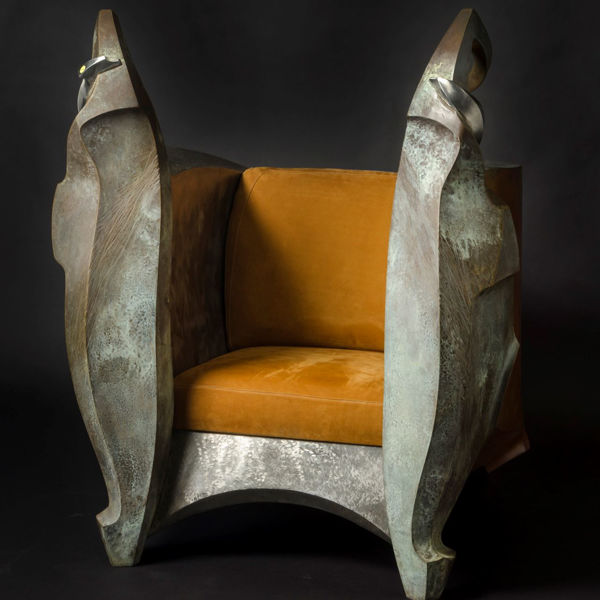Ceramics
Title: Pre-Columbian Pyramidal Skull No. III
Notkin’s skull & pyramid symbolism takes on minor functional significance in this piece, the object accruing the personality of a camp-shock film prop or pulp costume-like apparatus. The quality of sculpting and moulding allows a similarly heightened sense of reality, the texture of the clay buffed and brushed with a metallic glaze to give the appearance of metal and suggesting a density and physicality far greater than in actuality.
Title: Priscilla - Untitled Mystery Ewer
Saxe fixes a sharp wit into his series’ of ceramic vessels, gently undermining their functionality whilst refining their sense of craft. ‘Untitled Mystery Ewer (Priscilla)’, like many of Saxe’s pieces, raises itself as a clashing of old and new. Figuratively traditional, the folky, milk-maid-like rendering of the female form is cut with a faint, indismissable contemporariness in its realisation. The subtle metallic finish and affixed gemstones applied across the teapot present a calculated reflection on post-modern vulgarity masqueraded as neoclassicism, the application of the teapot itself also hijacked as a further, brusque psycho-sexual disruption.
Title: Putin
Cole’s ceramics have been referred to as ‘3d political cartoons’, jarring conventional or customary political observation to gain a fresh perspective on globalisation and mass production. Here with ‘Putin’ we see Cole’s figurative purpose, the portrait sculpted remarkably realistically, but subtle accentuations of personality and character suggest a harder fought, more ironic rendering of the man — the tiny feet, the strange apparition-like quality thrusted upon him with exposed white clay left for flesh tones. The small and vivid red concealed within his hands an easy metaphor from the artist of Putin’s bloody history, or a concealed sympathy ongoing for Russia’s past red soviet ideals.
Title: Rabbit with Vase
Bobrowski’s ‘Rabbit with Vase’ is a loose and playful capturing of the animal, interested in capturing the essence of the creature as much as any objective rendering, and opining on the relationship between nature and culture. The works surface is roughly inscribed, accruing detail through a patchwork of glazes that seem latently or automatically introduced — but which, with time, begin to reveal an enclosed network of figurative detail. The simple salt-glazed vessel besides the animal may meditate upon origins of material and the sculptural versus functional application of the work, or else adds some strange knowing legend to the form.
Title: Raised Oval Song
Lambe’s harmonic combination of natural and sculptural provides her ceramic a gentle abstraction — the texture and dynamics of ‘Raised Oval Song’ relatable to the odder persuasions of oceanography or animal evolution, and tussling with a state of real versus unreal. The off-white ceramic skin of the pebble-like shape is rendered with a multitude of corralled extrusions and pin-prick whorls, the surfaced smooth and rolled as though picked from a shore.
Title: Raku Fired Vessel
PAUL SOLDNER (1921-2011); Rare raku-fired vessel with dancing figures in silhouette
Title: Reclining Figure
Nishigawara reduces histories and artefacts of culture into interpretive vignettes, acting upon his curiosity in a contemplative and interpretive manner that often finds figurative elements reduced to shortened, deformed, or incomplete divisions of the body. The ‘Reclining Figure’ is a subtle example, the body of the female complete but curiously foreshortened. A use of burnished white porcelain and classically Western or European styling links with subtle Asian traits to downplay frames of reference and increase focus on aspects of beauty and eroticism.
Title: Reclining Nude
Glazed porcelain sculpture of a reclining nude, USA, 1930s; Signed; 6 1/4" x 11 1/2" x 4 1/2" Note: One of two Gregory figures included in the 1937 Everson Museum Annual of America
Title: Rotation
Isupov strange, surreal deformations of human character merge observation and imagination, creating a ‘collage’ of memory and fleeting reference that captures images, faces and movements in sculptural object. ‘Rotation’ seems to merge several recognisable shapes into a compound of human, demon, animal and elemental; the artist using a theatrical selection of colour for impressively detailed surface painting that adds further reference, additional landscape and more figurative elements into the two-dimensional plane of the hand-thrown body. Disassociation with gender plays heavily across the artists work, and here bodies embrace androgyny or find a harmonising mirror image of male and female.
Title: Royal Red Vase
Kottler’s sense of humour and irreverence for established modes of art theory was cultivated by his exposure to California Funk — an artistic movement in 60s-70s that rebelled against nonobjectivity and celebrated crude or unrefined results, with particular regard to ceramics as a sculptural device. “Royal Red Vase” defines its form by the use of a Rubens-Vase effect, the artist mirroring his own inward-facing silhouette to create the illusion of a vase in negative space as a visual gag. It performs its role as a vase, a sculpture, and a self-portrait; whilst adhering to few traditional notions of those formats.



